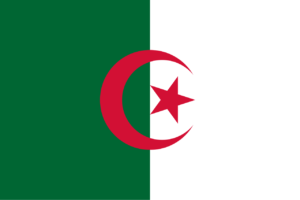
A survey conducted by Active Group and Experts Club in August 2025 showed that Ukrainians’ attitude towards Algeria remains neutral overall.
According to the results, 75% of respondents said they were neutral towards the country. Positive assessments accounted for only 11.7% (of which 9.3% were mostly positive and 2.3% were completely positive). At the same time, 6% had a negative attitude, and another 7.3% of respondents said they were not familiar with Algeria at all.
“For Ukrainians, Algeria remains a relatively distant country, which explains the high level of neutral assessments. At the same time, positive attitudes still prevail over negative ones, and this creates a basis for further cooperation,” commented Alexander Pozniy, head of Active Group.
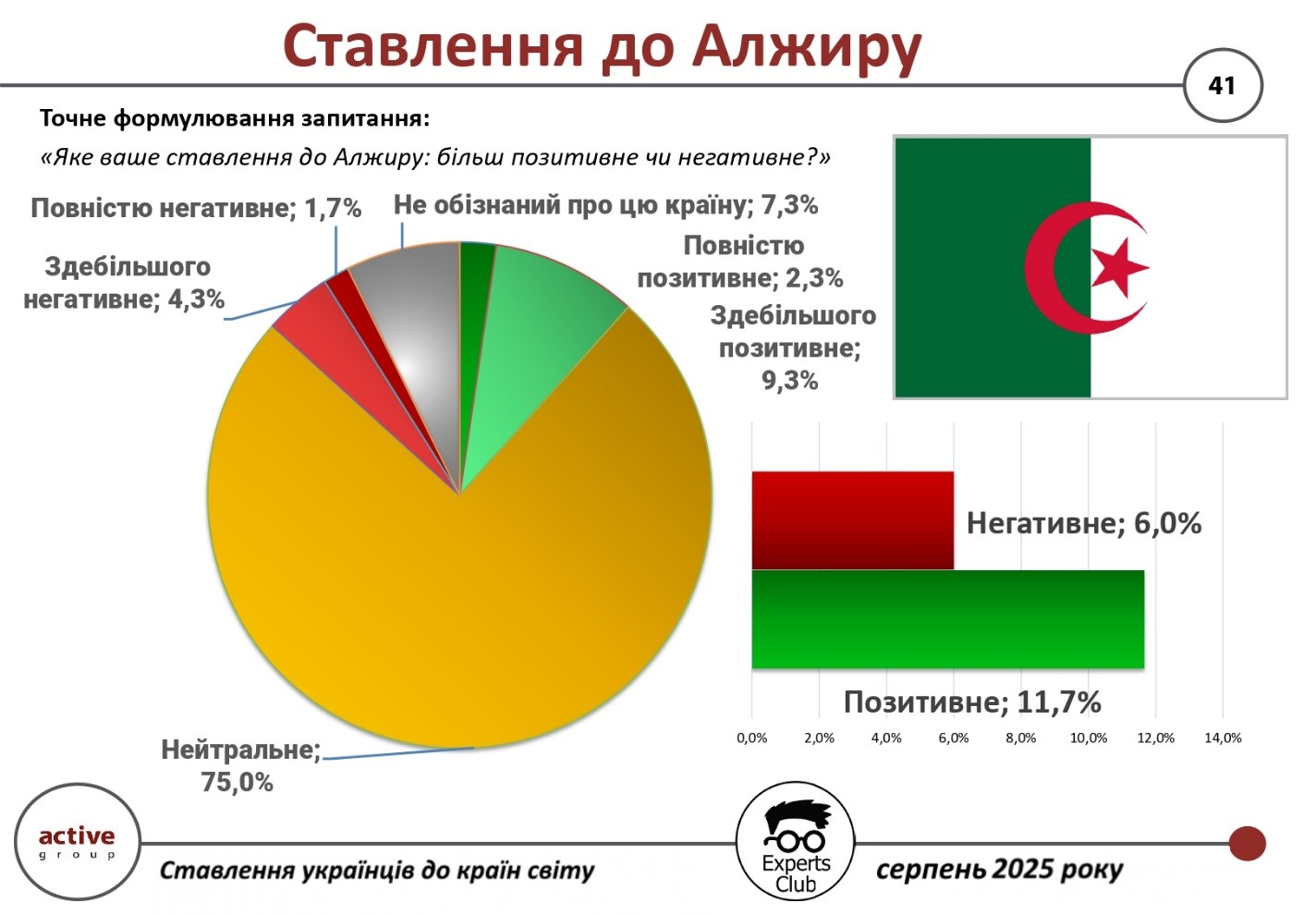
In turn, Experts Club co-founder Maksim Urakin emphasized the importance of economic ties:
“Despite relatively weak emotional perceptions, Ukraine and Algeria have a noticeable level of trade interaction. In 2025, bilateral trade exceeded $401 million. At the same time, Ukrainian exports amounted to $338.9 million, while imports of Algerian goods amounted to only $62.4 million. As a result, the trade balance is significant and positive for Ukraine — over $276 million. This indicates that economic cooperation can become the basis for further development of relations,” he stressed.
Thus, although Ukrainians’ attitude toward Algeria is mostly neutral, the economic balance looks very favorable for Ukraine.
The full video can be viewed at: https://www.youtube.com/watch?v=YgC9TPnMoMI&t
You can subscribe to the Experts Club YouTube channel here: https://www.youtube.com/@ExpertsClub
ACTIVE GROUP, ALGERIA, EXPERTS CLUB, Pozniy, SOCIOLOGY, TRADE, UKRAINE, URAKIN

More than half of Ukrainians express a neutral attitude toward Iraq, but at the same time, a significant proportion of respondents rated the country negatively. This is evidenced by the results of a survey conducted by Active Group in cooperation with the Experts Club think tank.
According to the study, 53.7% of respondents said their attitude toward Iraq is neutral. At the same time, 37.0% said they have a negative attitude (11.3% — completely negative, 25.7% — mostly negative). Only 5.7% of Ukrainians expressed positive views (1.7% — completely positive, 4.0% — mostly positive). Another 3.7% of respondents said they were not familiar with the country.
“Ukrainians associate Iraq primarily with wars, instability, and crises, which significantly affects their perception of the country. At the same time, more than half of the respondents demonstrate a neutral position, which indicates the absence of a clear personal assessment,” commented Alexander Pozniy, head of Active Group.
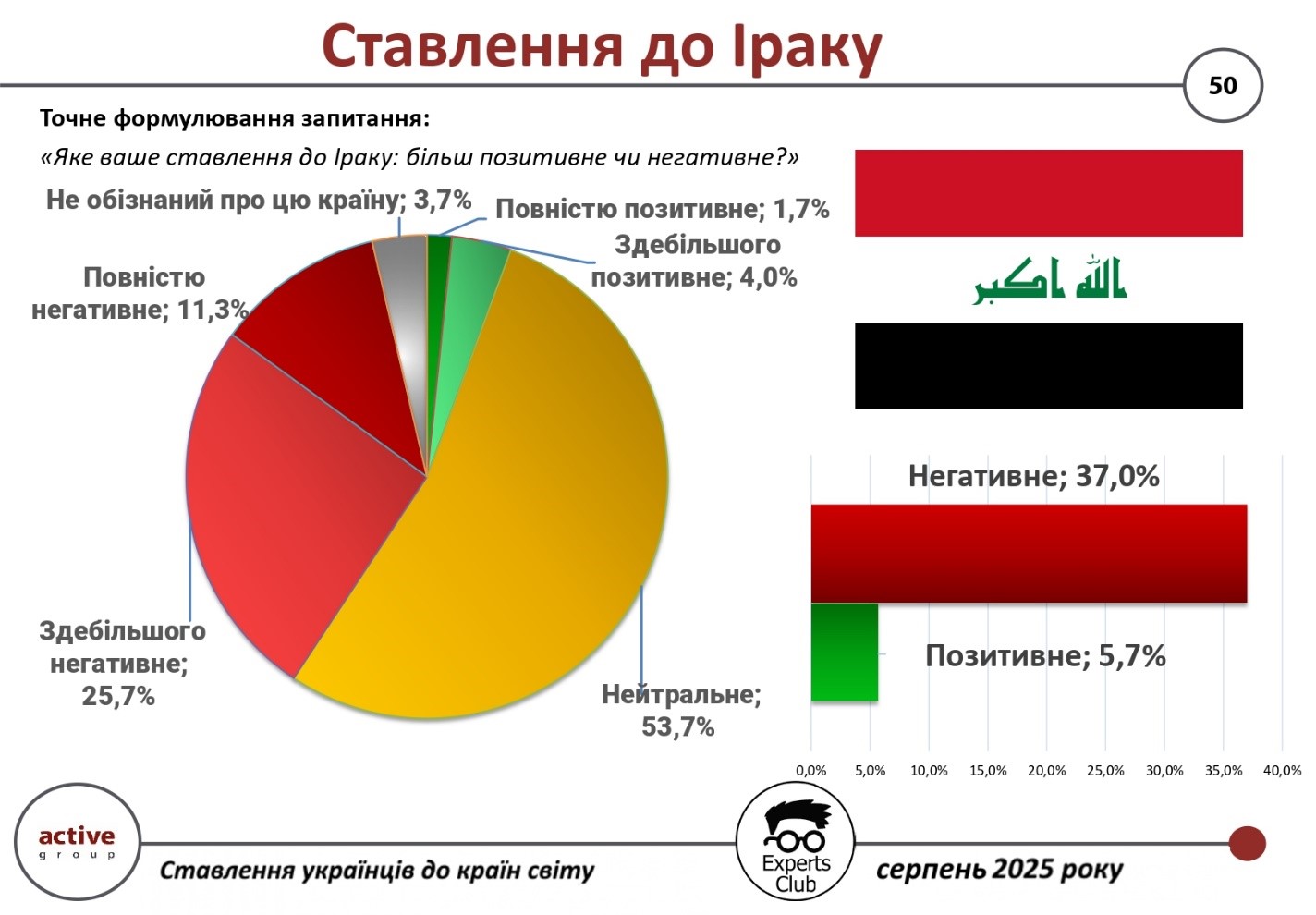
Maksim Urakin, co-founder of Experts Club, emphasized the specifics of economic relations.
“Despite the fact that some of our fellow citizens may confuse Iran and Iraq, the latter is one of our most profitable trading partners. Ukraine’s trade turnover with Iraq in January-August 2025 amounted to $189.3 million. At the same time, exports from Ukraine amounted to $189.2 million, while imports amounted to only $0.16 million. This structure creates a significant positive balance of over $189 million, making Iraq primarily a market for Ukrainian products rather than a source of imports,” Urakin emphasized.
Thus, Ukrainians’ attitude toward Iraq remains neutral overall, with a high proportion of negative assessments, while economic relations are one-sided and focused on Ukrainian exports.
The full video can be viewed at: https://www.youtube.com/watch?v=YgC9TPnMoMI&t
You can subscribe to the Experts Club YouTube channel here: https://www.youtube.com/@ExpertsClub
ACTIVE GROUP, EXPERTS CLUB, IRAQ, Pozniy, SOCIOLOGY, TRADE, UKRAINE, URAKIN

Experts Club has released a video analysis dedicated to the dynamics of gold production in the world by leading countries. Over the past half-century, the structure of global gold production has changed significantly: while South Africa and the USSR were the leaders in the 1970s, by the 2020s, China, Australia, and Russia had taken the lead.
China is now the largest gold producer in the world, having led the field by a significant margin for almost 20 years. Russia is in second place, Australia in third.
Further down the top ten are Canada, the US, Ghana, Mexico, Indonesia, Peru, and Uzbekistan.
In the 1970s and 1990s, South Africa dominated, accounting for up to two-thirds of global gold production. The gradual depletion of deposits and rising costs led to a decline in its share. South Africa has now fallen out of the top ten countries in terms of gold production.
In the 1990s, Russia took the lead, and in the last two decades, there has been significant growth in gold production in Australia, Canada, and African countries (Ghana, Mali).
Total global gold production has more than doubled since 1975, exceeding 3,600 tons per year by 2023–2024.
Since the early 2020s, gold has been steadily updating its historical highs amid geopolitical instability and inflationary risks. As of September 2025, the price of gold reached about $3,710-$3,730/ounce. This rapid rise in price is supported by increased demand from central banks, investment flows into ETFs, and expectations of lower interest rates in the US.
For more details on the struggle between countries for global leadership in gold production, see the video from Experts Club – https://www.youtube.com/shorts/DWbzJ1e2tJc
“Gold is not only used in the jewelry industry and finance, but also in electronics (coating contacts and connectors, where high conductivity and corrosion resistance are important), modern computers and smartphones are impossible without the use of gold. Gold is used in aviation and space technology, medicine, and lasers. Gold is also used as a catalyst in chemical reactions (for example, in the production of certain types of fuel),” commented Maxim Urakin, candidate of economic sciences and co-founder of the Experts Club information and analytical center, in the video.
The rise in prices confirms the importance of gold as a “safe haven” in times of global turbulence.
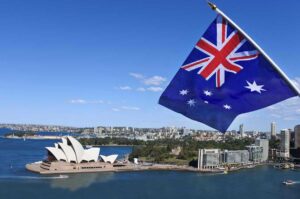
According to the results of a study conducted by Active Group in collaboration with Experts Club in August 2025, Ukrainians’ attitude towards Australia is predominantly positive. 63.0% of respondents expressed a positive attitude towards this country, while only 2.2% of respondents had a negative attitude. At the same time, 32.3% took a neutral position, and 2.4% admitted that they found it difficult to answer this question.
The largest share of positive responses fell into the “mostly positive” category – 40.0%, while 23.0% of respondents expressed a “completely positive” attitude. On the other hand, 1.9% of respondents had a “mostly negative” attitude, and only 0.4% had a “completely negative” attitude.
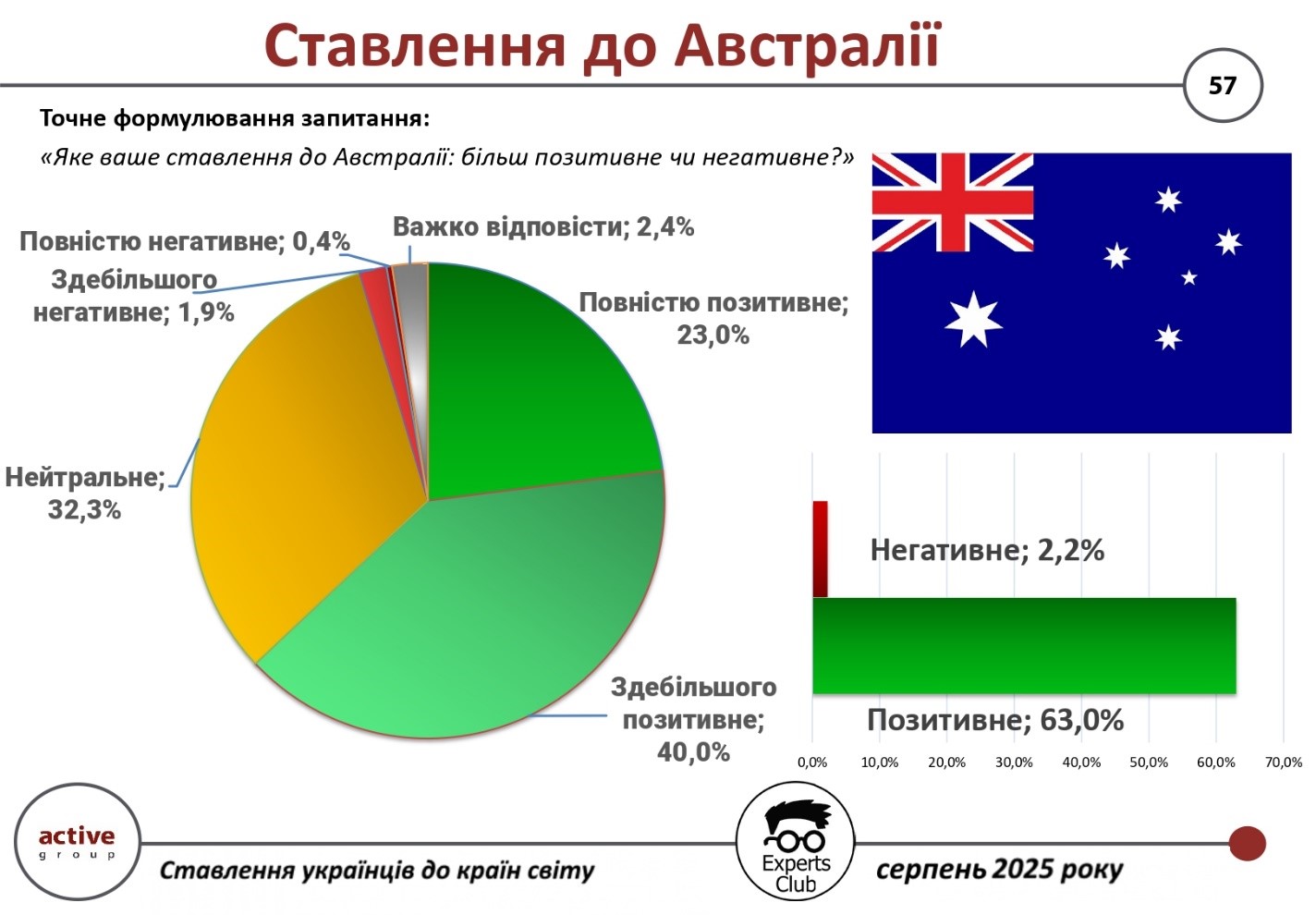
In 2024, trade turnover between Ukraine and Australia amounted to US$157.4 million. At the same time, exports of Ukrainian goods to Australia amounted to only US$6.4 million, while imports of Australian products amounted to US$151.0 million. The negative balance for Ukraine was recorded at US$144.6 million.
“The main areas of Australian exports to Ukraine traditionally include mineral raw materials, industrial goods, and agricultural products. In contrast, Ukrainian exports to Australia have a limited range and are mainly concentrated in the agricultural and metallurgical sectors,” notes economist and founder of Experts Club Maksim Urakin.
The full video can be viewed at: https://www.youtube.com/watch?v=YgC9TPnMoMI&t
You can subscribe to the Experts Club YouTube channel here: https://www.youtube.com/@ExpertsClub
ACTIVE GROUP, AUSTRALIA, EXPERTS CLUB, Pozniy, SOCIOLOGY, TRADE, UKRAINE, URAKIN
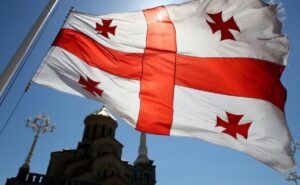
Most Ukrainians have a positive opinion of Georgia, according to the results of a survey conducted by Active Group in collaboration with the analytical center Experts Club.
According to the study, 56.3% of Ukrainians expressed a positive attitude towards Georgia: among them, 14.3% are completely positive, and 42.0% are mostly positive.
At the same time, 10.7% of respondents have a negative attitude (1.7% completely negative and 9.0% mostly negative). A third of respondents (32.3%) remain neutral, while another 0.7% admitted that they are not sufficiently knowledgeable about the country.
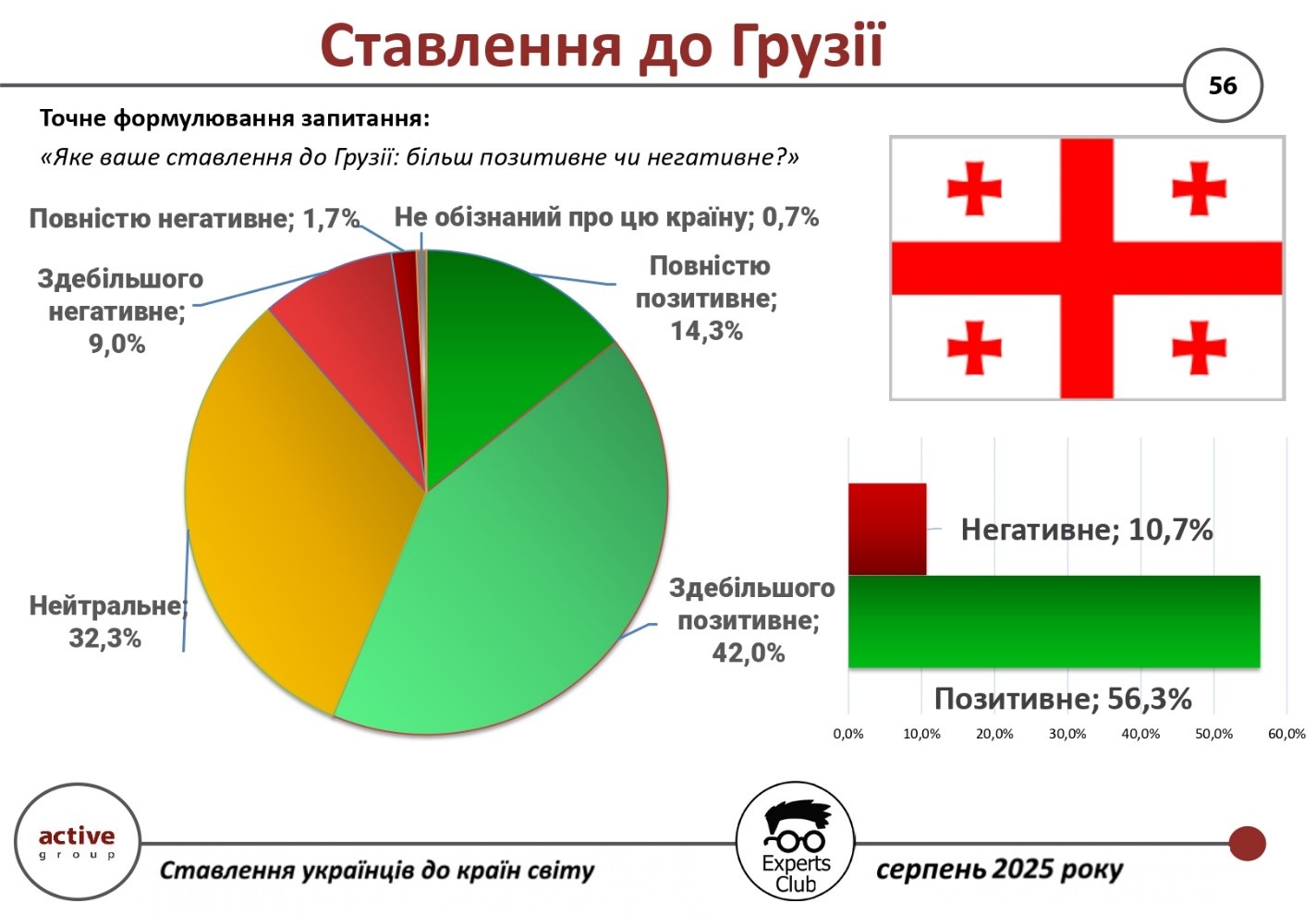
At the end of 2024, Ukraine’s trade turnover with Georgia amounted to $1,828.2 million. Exports of Ukrainian goods to Georgia reached $1,360.8 million, while imports amounted to $467.4 million. Thus, Ukraine had a positive bilateral trade balance of $893.4 million.
According to economist and founder of Experts Club Maksim Urakin, the positive balance with Georgia reflects a sustained interest in mutual cooperation:
“Georgia traditionally remains an important trading partner for Ukraine in the Caucasus. The high level of positive attitudes among Ukrainians toward this country is a favorable foundation for the further development of economic and cultural relations,” the expert emphasized.
Thus, Georgia is among the group of countries that Ukrainians view mostly positively, and strong economic ties and shared historical proximity create the basis for further deepening the partnership.
The full video can be viewed at: https://www.youtube.com/watch?v=YgC9TPnMoMI&t
You can subscribe to the Experts Club YouTube channel here: https://www.youtube.com/@ExpertsClub
ACTIVE GROUP, EXPERTS CLUB, GEORGIA, Pozniy, SOCIOLOGY, TRADE, UKRAINE, URAKIN

A survey conducted by Active Group in collaboration with Experts Club showed that most Ukrainians refrain from giving clear assessments of Malaysia: 68.3% of respondents said they had a neutral attitude toward this country.
At the same time, 18.7% of Ukrainians expressed a positive attitude (in particular, 2.3% said they were “completely positive” and 16.3% said they were “mostly positive”), while 4.7% expressed a negative attitude. Another 8.3% of respondents admitted that they did not have enough information about Malaysia to form an opinion.
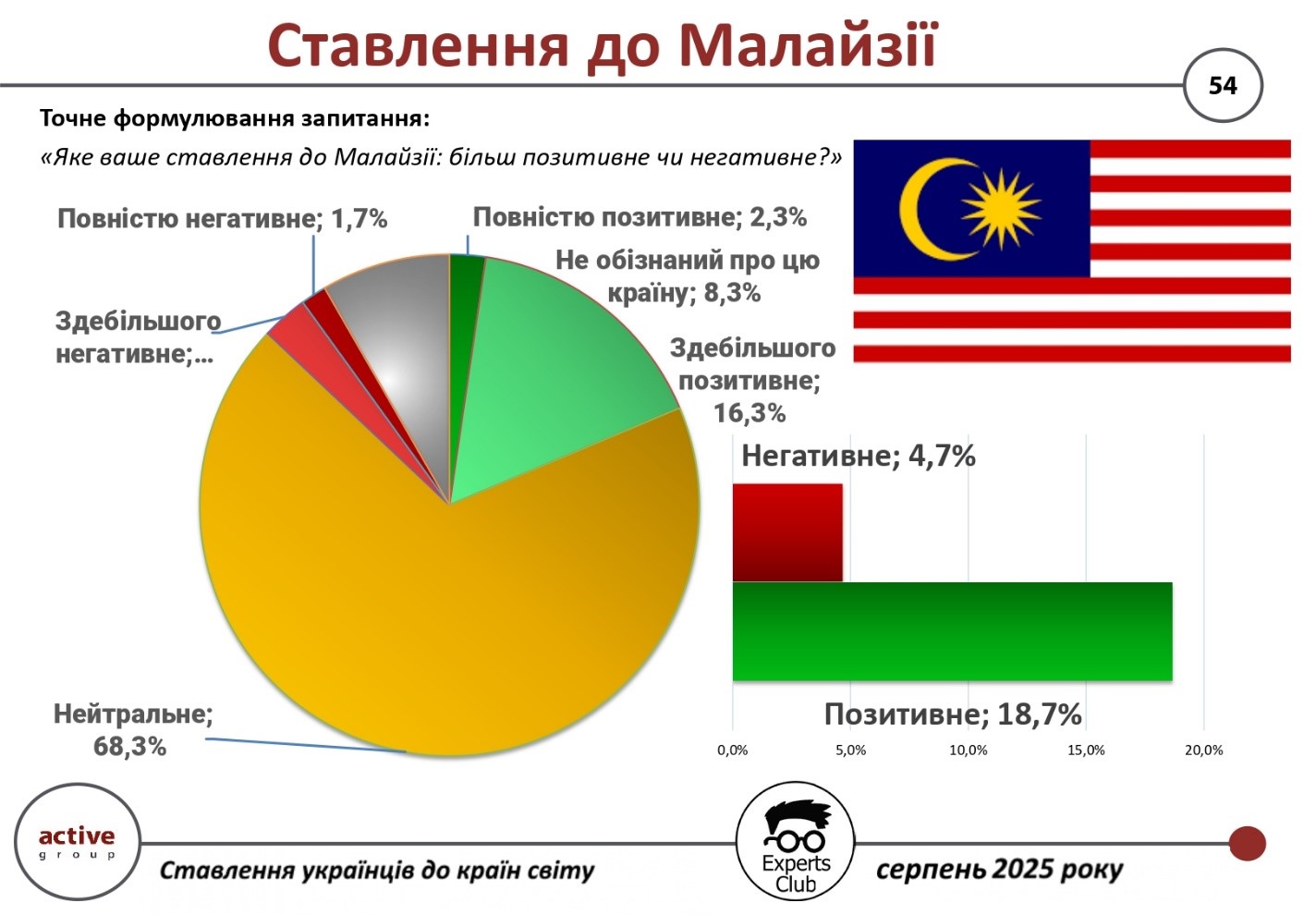
According to the results of Ukraine’s foreign trade with Malaysia in the first half of 2025, the trade turnover amounted to $193.8 million. At the same time, Ukrainian exports amounted to only $41.2 million, while imports from Malaysia reached $152.6 million.
Thus, the negative balance for Ukraine amounted to $111.4 million, which indicates a significant dependence on Malaysian imports.
The founder of Experts Club, economist Maksim Urakin, emphasized that in relations with Malaysia, it is worth focusing on expanding Ukraine’s export opportunities.
“Today, we see a significant imbalance in trade with Malaysia, which reduces the economic effect of cooperation for Ukraine. A promising direction could be agro-industrial exports, in particular products from the food and processing industries. At the same time, the neutral attitude of most Ukrainians opens up space for the development of cultural and information diplomacy,” the expert stressed.
The full video can be viewed at: https://www.youtube.com/watch?v=YgC9TPnMoMI&t
You can subscribe to the Experts Club YouTube channel here: https://www.youtube.com/@ExpertsClub
ACTIVE GROUP, EXPERTS CLUB, MALAYSIA, Pozniy, SOCIOLOGY, TRADE, UKRAINE, URAKIN